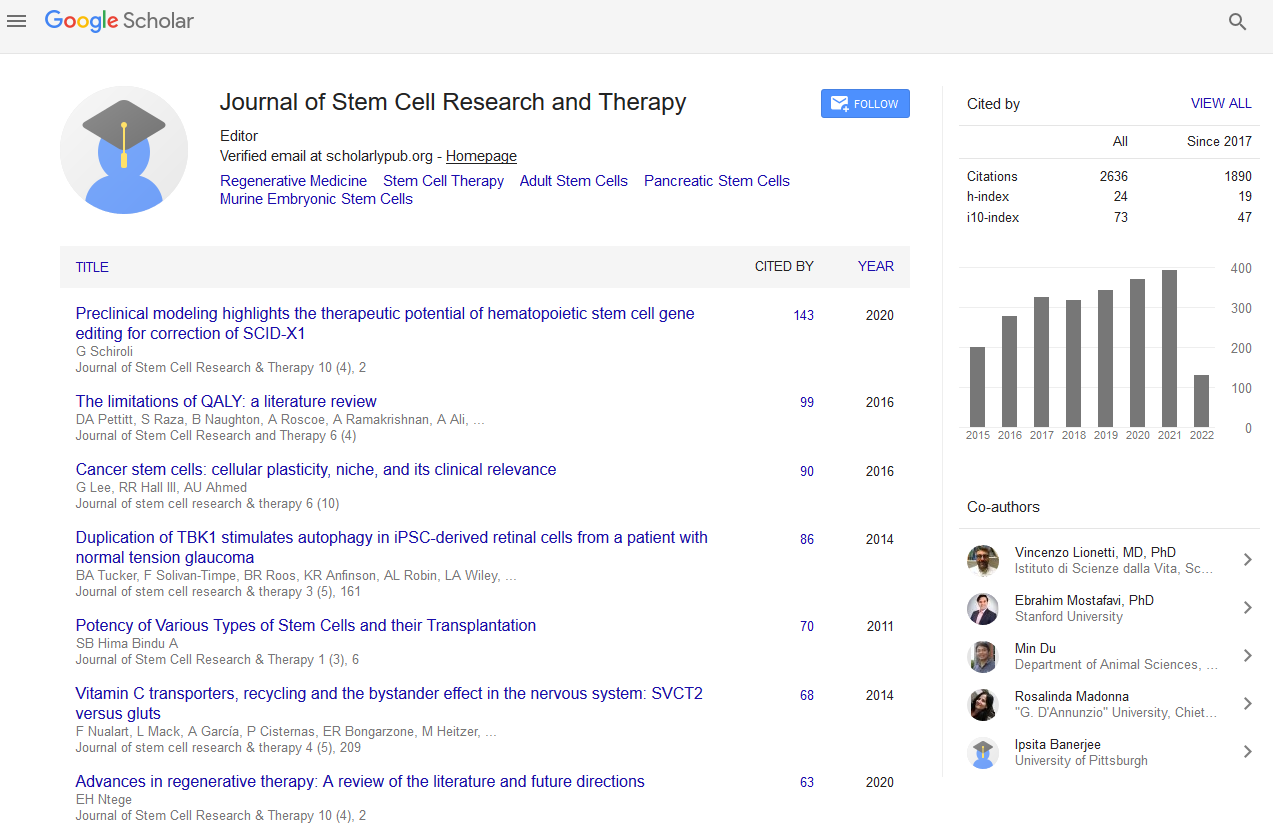Indexed In
- Open J Gate
- Genamics JournalSeek
- Academic Keys
- JournalTOCs
- China National Knowledge Infrastructure (CNKI)
- Ulrich's Periodicals Directory
- RefSeek
- Hamdard University
- EBSCO A-Z
- Directory of Abstract Indexing for Journals
- OCLC- WorldCat
- Publons
- Geneva Foundation for Medical Education and Research
- Euro Pub
- Google Scholar
Useful Links
Share This Page
Journal Flyer

Open Access Journals
- Agri and Aquaculture
- Biochemistry
- Bioinformatics & Systems Biology
- Business & Management
- Chemistry
- Clinical Sciences
- Engineering
- Food & Nutrition
- General Science
- Genetics & Molecular Biology
- Immunology & Microbiology
- Medical Sciences
- Neuroscience & Psychology
- Nursing & Health Care
- Pharmaceutical Sciences
The development of safe and effective polymeric carriers for siRNA delivery in functional medicine research
International Conference on Regenerative & Functional Medicine
November 12-14, 2012 Hilton San Antonio Airport, USA
Arun R Shrivats
Scientific Tracks Abstracts: J Stem Cell Res Ther
Abstract:
RNA interference is a powerful therapeutic tool capable of silencing pathology-inducing genes and as such, it has a compelling scope in functional medicine research. The greatest barrier to successful RNA interference has been achieving safe and therapeutically effective delivery of short interfering RNA (siRNA) to target cells. To this purpose, we have developed cationic nanostructured polymers (NSPs) with two varying architectures ? nanogels and stars ? by atom transfer radical polymerization. The in vitro biocompatibility of NSPs was evaluated using MTS, lactate dehydrogenase and PicoGreen assays in multiple cell types (MC3T3, C2C12, LLC-PK1, and hMSCs). Both NSPs were determined to be nontoxic up to concentrations of 800 μg/mL. In vivo biocompatibility was determined by NSP loading in Synthes XCM? scaffolds and subsequently implanting them in mice for 4 weeks; histological sections were stained with H&E. The modest inflammation was observed in both NSP groups was determined to fall within clinical tolerance. Complexation ratios (ng:ng) of NSP to siRNA were assessed using gel electrophoresis and were determined to be 2000:1 for the stars and 15:1 for nanogels. The internalization ability of TRITC-nanogels into MC3T3 cells and hMSCs was assessed by confocal microscopy. Knock down of target proteins was demonstrated using the Dual-Luciferase Reporter? system in S2 cells. NSP:siRNA ratios of 2:1 knocked down luciferase expression at comparable levels to that of FuGENE HD?. Overall, data strongly suggest NSP biocompatibility both in vitro and in vivo , as well as the ability to internalize into cells and knock down target protein expression in vitro .
Biography :
Arun R Shrivats is a doctoral student at Carnegie Mellon University, researching under Dr. Jeffrey O. Hollinger. His thesis research focuses on developing a therapy for fibrodysplasia ossificans progressiva using an RNA interference platform.


